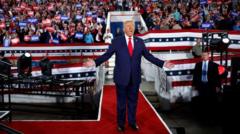As world leaders prepare for COP29, the recent election of Donald Trump is anticipated to pose a significant challenge to global climate initiatives. Drawing on his history of climate skepticism, Trump’s return to the White House raises concerns amongst experts about a potential setback in critical actions needed to combat climate change effectively.
The President-elect’s past stance on green energy, labeling it a "scam," casts uncertainty on future US commitments, especially as he gears to withdraw from the Paris climate agreement. The treaty, which coordinated the global effort to curtail greenhouse gas emissions, is now at risk, potentially allowing the US to "take a break" from facing international regulations.
Richard Klein from the Stockholm Environment Institute remarked, "The US at this COP is not just a lame duck, it's a dead duck," emphasizing the reluctance of other nations, particularly China, to engage in significant commitments without the US leading the charge.
While the Biden administration's negotiators will be present at the talks in Azerbaijan, any agreements reached cannot be enforced by the incoming Trump administration, thus limiting their effectiveness. Financial considerations for developing nations may also stall, as the US previously sought contributions from countries like China to support climate adaptation.
Furthermore, indications suggest that Trump will aggressively promote oil and gas exploration domestically while experiencing internal party opposition. Simultaneously, sustainable energy initiatives, such as Biden's Inflation Reduction Act—which funnels $1 trillion into green projects—remain popular even among Republican districts.
Economists and climate leaders remain hopeful that the broader transition to renewable energy sources cannot be easily halted, even under Trump's leadership. Christiana Figueres, former UN climate chief, stated, "While this election result is a blow to global climate action, it cannot and will not halt the unfolding changes towards decarbonizing the economy."
As the global climate agenda faces heightened challenges, the long-term implications of Trump's presidency on sustainable energy remain ambiguous, underscored by a growing public interest in renewable sources and continued global investment in clean technologies.




















